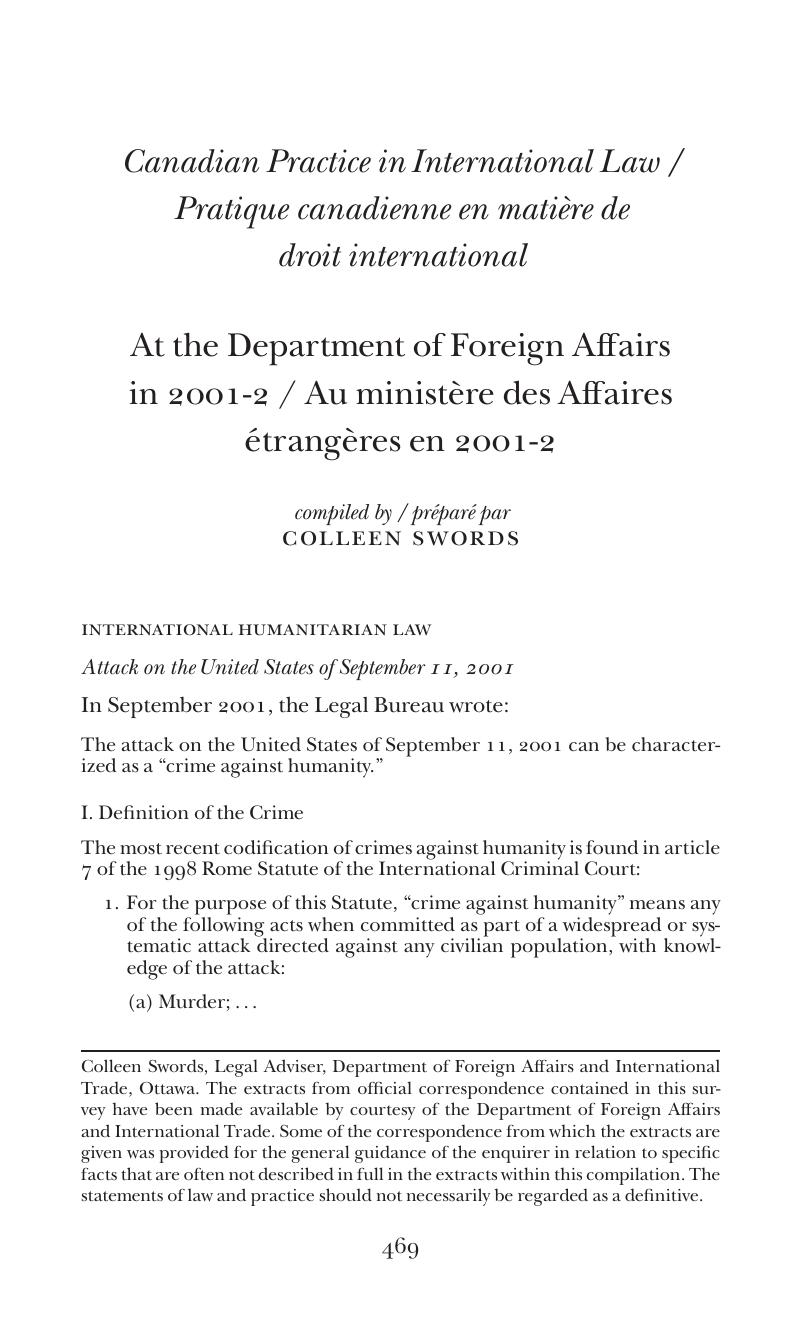Article contents
At the Department of Foreign Affairs in 2001-2 / Au ministère des Affaires étrangères en 2001-2
Published online by Cambridge University Press: 09 March 2016
Abstract

- Type
- Canadian Practice in International Law / Pratique canadienne en matière de droit international
- Information
- Canadian Yearbook of International Law/Annuaire canadien de droit international , Volume 40 , 2003 , pp. 469 - 498
- Copyright
- Copyright © The Canadian Council on International Law / Conseil Canadien de Droit International, representing the Board of Editors, Canadian Yearbook of International Law / Comité de Rédaction, Annuaire Canadien de Droit International 2003
References
1 Territorial Sea Geographical Co-ordinates (Area 7) Order (Privy Council 1985–2739).
2 Johnston, D., “The Northwest Passage Revisited,” manuscript, at 4–5, subsequently published in (2002) 33(2) Ocean Development and International Law 145–64.CrossRefGoogle Scholar
3 L. Legault, “Climate Change and the Law of the Sea in the Canadian Arctic, (unpublished paper presented to the Canadian Maritime Seminar on Global Warming and Canada’s Shipping Lanes, Montreal, June 16, 2001) at 3.
4 External Affairs Canada, Statements and Speeches, “Policy on Canadian Sovereignty,” September 10, 1985.
5 Huebert, R., “The Impact of Climate Change on the Northwest Passage” (2001) 2(4) Isuma: Canadian Journal of Policy Research.Google Scholar
6 Legault, supra note 3 at 6.
7 Corfu Channel Case, Merits, Judgment, I.C.J. Reports 1949.
8 Agreement between Canada and the United States of America, signed and in force January 11, 1988, C.T.S. 1988, no 29.
9 Pursuant to section 3 of the agreement, the United States government requests the Canadian government’s consent for its vessels to conduct scientiic research during voyages of icebreakers and the Canadian Government grants its consent to the transit. For a succinct analysis of the Agreement, see Purver, R. G., “Aspects of Sovereignty and Security in the Arctic” in McRae, D., and Munroe, G., ed., Canadian Oceans Policy: National Strategies and the New Law of the Sea (Vancouver: UBC Press, 1989).Google Scholar
10 Arctic Waters Pollution Prevention Act, R.S.C. 1985, c. A-12.
11 United Nations Convention on the Law of the Sea, done at Montego Bay, December 10, 1982, entered into force November 16, 1994, 34 I.L.M. 1547 (1995) [hereinafter LOSC].
12 Some commentators have argued that because Canada is not yet a party to LOSC, this basis of authority if this provision is questionable (see Huebert, supra note 5 at 7.) and express doubt about assertions of other commentators that Article 234, like much of the LOSC, has now achieved the status of customary international law owing to the almost universal adherence to its provisions.
- 1
- Cited by


